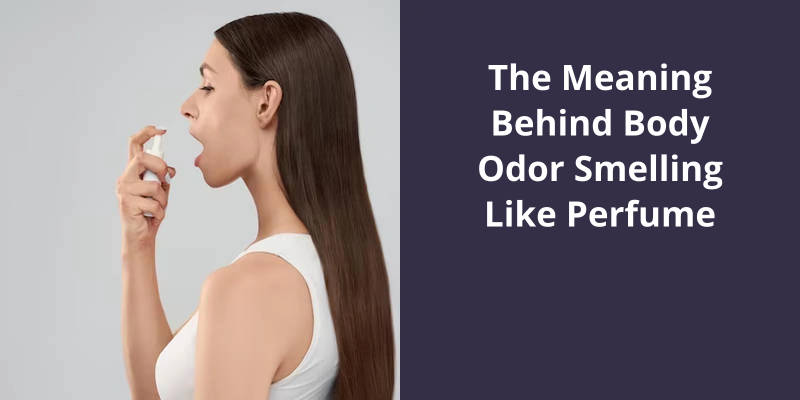The phenomenon of body odor smelling like perfume can be attributed to several reasons. The primary reason could be the reaction of your sweat and the bacteria on your skin, which can emit a scent similar to perfume. In some cases, it could also be related to the food or drink you’ve recently consumed, as certain items can influence the type of body odor you produce. Some individuals may also naturally have a sweet or pleasant smelling body odor, and with external influences such as soaps or lotions, this could come off as perfume-like. However, it’s significant to note that a change in body odor could sometimes be a sign of certain health issues, so if you notice a major shift in how your body smells, it may be wise to consult a health professional.

What Diseases Give Off an Odor?
Several medical conditions and diseases can cause changes in a persons usual body scent. One such condition is diabetes, which can lead to a fruity or sweet odor. This scent is due to the presence of excess sugar in the body, which is excreted through sweat and other bodily fluids. Gout, a form of arthritis, can also produce a distinct odor. This is caused by the buildup of uric acid crystals in the joints, which can result in a foul-smelling sweat.
Menopause, a natural stage of life for women, can also impact body odor. Additionally, an overactive thyroid, or hyperthyroidism, can cause excessive sweating and a musky or ammonia-like odor. This is due to an increase in metabolism and heat production caused by the overactive thyroid gland.
Liver disease and kidney disease can both lead to changes in body odor. In liver disease, such as cirrhosis or hepatitis, a musty or sweet odor may be present. This is because the liver is responsible for metabolizing toxins, and when it isn’t functioning properly, these toxins can build up in the body. Kidney disease, on the other hand, can cause a urine-like odor in the breath and sweat. This is due to the kidneys role in filtering waste products from the blood.
Infectious diseases can also give off distinct odors. For example, certain bacterial infections can produce an unpleasant smell. This is often the result of the bacteria breaking down proteins and releasing compounds with a strong odor. Conditions such as tuberculosis and some types of pneumonia can also cause a distinctive odor in the breath and sweat.
Overall, it’s important to note that changes in body odor should never be ignored, as they can be a sign of underlying medical conditions. If you notice any unusual or persistent odors, it’s recommended to consult a healthcare professional for proper diagnosis and treatment.
Cancer and Body Odor: Some Types of Cancer, Such as Lung Cancer or Ovarian Cancer, Can Cause Changes in Body Odor. These Changes May Be Due to the Release of Certain Chemicals or the Breakdown of Proteins by Cancer Cells.
Some types of cancer, such as lung cancer or ovarian cancer, can cause changes in body odor. These changes may be due to the release of certain chemicals or the breakdown of proteins by cancer cells.
In fact, there are various factors that can contribute to unexplained body odor. While it’s common for fluctuations in diet and physical activity to play a role, it’s important to be aware that certain medical conditions can also lead to changes in body odor. It’s crucial to understand the potential causes and implications of unexplained body odor and to seek professional advice if necessary.
What Causes Unexplained Body Odor?
What causes unexplained body odor? They’re often the result of lifestyle changes, such as an altered diet or exercise regimen. However, in some cases, a sudden change in body odor can be a sign of an underlying health condition. Generally speaking, body odor can affect anyone, and it shouldn’t usually cause a person to worry.
One common cause of body odor is poor hygiene. When sweat mixed with bacteria on the skins surface, it can produce an unpleasant odor. This can be remedied by washing regularly with soap and water, and using antibacterial products when necessary. Certain foods like garlic, onions, and spices can cause body odor to become more noticeable.
During puberty, and sometimes during menopause, changes in hormone levels can lead to increased sweating and body odor. Stress and anxiety can also contribute to body odor, as they can increase sweating. For example, diabetes, liver disease, and certain genetic disorders can all affect body odor.
Hormone imbalance can indeed be a factor in body odor changes. For instance, during menopause, hot flashes and hormonal fluctuations can cause excessive sweating, resulting in shifts in body odor. Likewise, some individuals report experiencing changes in body odor during pregnancy or menstruation.
Can Hormone Imbalance Cause Body Odor?
Can hormone imbalance cause body odor? One common example is during menopause, where hot flashes, night sweats, and hormonal fluctuations lead to excessive sweating. This increased perspiration can bring about changes in body odor. It isn’t uncommon for women to notice that their body odor becomes stronger or takes on a different scent during this stage of life.
Another time when hormonal changes can affect body odor is during pregnancy. This can make their body odor smell different than usual, sometimes even resembling a perfume-like scent.
Diet, hygiene habits, and certain medical conditions can all play a role in how our bodies smell.
While it may be disconcerting for those experiencing these changes, it’s a normal physiological response and usually nothing to be overly concerned about. If the changes in body odor are accompanied by other concerning symptoms, it may be beneficial to consult with a healthcare professional to rule out any underlying medical conditions.
Phantosmia, also known as olfactory hallucination or phantom odor, is a sensory phenomenon that causes individuals to perceive smells that don’t exist in their surroundings. These perceived odors, which can be either pleasant or foul, vary from person to person and may be experienced in one or both nostrils.
Why Do I Smell Perfume When There Is None?
Phantosmia, also known as olfactory hallucination or phantom smell, is a phenomenon where an individual experiences the perception of smelling an odor, even though there’s no actual scent present in the environment. This perplexing occurrence can vary greatly in terms of the type of smell experienced, ranging from foul and unpleasant aromas to delightful and fragrant scents, such as perfume.
While the exact cause of phantosmia isn’t entirely understood, it’s believed to be linked to various factors. One possible explanation is that it may be a result of changes or abnormalities within the olfactory system. Conditions such as head trauma, sinus infections, nasal polyps, or even certain medications can potentially disrupt the normal functioning of the olfactory receptors, leading to the misinterpretation of smells.
How to Differentiate Between Phantosmia and Other Medical Conditions That May Cause Abnormal Smells, Such as Parosmia or Anosmia.
- Phantosmia is a condition where a person perceives a smell that isn’t present in their environment.
- Parosmia is another condition that affects a person’s sense of smell, causing them to perceive odors differently than they actually are.
- Anosmia refers to the complete loss of the sense of smell.
- There are certain factors that can help differentiate between these conditions:
- Duration of symptoms: Phantosmia and parosmia are typically temporary, while anosmia may be long-lasting or permanent.
- Onset of symptoms: Phantosmia often occurs as a result of neurological conditions, head injuries, or certain medications, whereas parosmia can be caused by viral infections or head trauma.
- Intensity of smells: Phantosmia can present with intense or overpowering smells, whereas parosmia often results in distorted or unpleasant odors.
- Associated symptoms: Anosmia may be accompanied by a reduced sense of taste, while phantosmia and parosmia may not affect taste perception.
- If you experience abnormal smells, it’s important to consult a healthcare professional for a proper diagnosis and appropriate treatment.
The sense of smell is a powerful and often overlooked aspect of our sensory experience. However, it isn’t immune to the influence of stress and anxiety. In some cases, people may develop a condition known as phantosmia, where they perceive smells that aren’t actually present. This peculiar phenomenon, also referred to as olfactory hallucination, can result in the perception of unusual or unpleasant odors. While the exact connection between stress and phantosmia isn’t yet fully understood, it’s believed that the two are linked, highlighting the intricate relationship between our emotional well-being and our sensory perceptions.
Can Stress Cause Strange Smells?
Our sense of smell is a powerful tool that can evoke strong emotions and memories. It’s known that stress can have a profound impact on our bodies and minds, but can it also cause our body odor to smell like perfume?
One possible explanation for this phenomenon is a condition called phantosmia, also known as an olfactory hallucination or a phantom odor. Phantosmia occurs when a person smells an odor that isn’t actually present. While the exact cause of phantosmia isn’t fully understood, it’s believed to be related to changes in the brains olfactory system.
Research suggests that stress can play a role in the development or worsening of phantosmia. When we’re stressed, our bodies release certain chemicals and hormones that can affect various systems in our body, including our sense of smell. This can result in a distorted perception of odors, causing a neutral smell to become unpleasant or even smelling something that isnt there.
It’s important to note that experiencing phantosmia doesn’t necessarily mean that there’s an underlying medical condition. In many cases, it can be a temporary response to stress or anxiety. However, if the phantom smells persist or cause significant distress, it’s important to consult a healthcare professional for further evaluation.
How to Differentiate Between Stress-Induced Phantosmia and Actual Odors
- Keep track of the time and frequency of the phantom smells
- Consult a professional healthcare provider for a comprehensive evaluation
- Explore potential triggers or stressors that may be contributing to the phantom smells
- Maintain a balanced diet and avoid potential food triggers
- Practice stress management techniques, such as exercise, meditation, or deep breathing exercises
- Consider exploring alternative therapies, such as acupuncture or aromatherapy
- Be mindful of any medication side effects that could be causing the phantom smells
- Follow a regular sleep pattern and ensure adequate rest
- Seek support from friends, family, or support groups
- Engage in activities or hobbies that bring joy and relaxation
Changes in body odor can sometimes serve as indicators of underlying health conditions, such as diabetes-related ketoacidosis or liver and kidney disease. In the case of diabetes, a fruity odor may arise due to high ketone levels in the blood, while toxin buildup in the body can lead to a bleach-like scent. Recognizing these unique odors could potentially help individuals identify and address potential health issues in a timely manner.
What Does Diabetic Body Odor Smell Like?
When it comes to diabetic body odor, there are certain characteristics to look out for. This can occur when there are high levels of ketones in the blood, leading to a condition called ketoacidosis. Ketones are produced when the body breaks down fats for energy instead of glucose. As a result, the blood becomes more acidic, and this change in pH can affect the way your body odor smells.
This is due to the buildup of toxins in the body, which the liver and kidneys would usually filter out. With these organs not functioning properly, these toxins can accumulate, leading to an altered body odor.
It’s important to note that changes in body odor shouldn’t be used as the sole diagnostic tool for diabetes or other diseases. These smells may be present in some individuals, but not in all cases. If you suspect any underlying health condition or notice any significant changes in your body odor, it’s crucial to seek medical advice.
Furthermore, body odor can be influenced by a variety of factors, including personal hygiene, diet, hormonal changes, and even medications. They’ll be able to help determine the cause of any changes in body odor and provide appropriate treatment if necessary.
Monitoring blood glucose levels, consulting with healthcare professionals, and undergoing relevant tests are crucial steps in identifying and managing diabetes and other potential health issues.
What Are the Symptoms of Diabetic Ketoacidosis?
Symptoms of diabetic ketoacidosis (DKA) include frequent urination, excessive thirst, high blood sugar levels, fruity breath odor, nausea and vomiting, abdominal pain, fatigue, confusion, and difficulty breathing. DKA is a serious complication of diabetes that occurs when the body produces high levels of ketones due to insufficient insulin. If left untreated, DKA can lead to life-threatening complications. It’s important to seek immediate medical attention if any of these symptoms occur.
Source: Body Odor: Causes, Changes, Underlying … – Cleveland Clinic
Conclusion
It unveils a deeper connection between our olfactory senses and the intricate workings of our bodies, resonating with the intricate interplay of biology, chemistry, and personal identity. The occurrence of such occurrences serves as a reminder that our bodies aren’t confined to their outward appearances, but rather they possess the ability to express and communicate in unexpected and remarkable ways.





